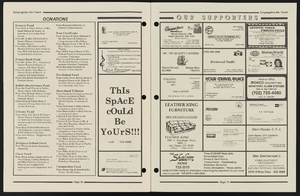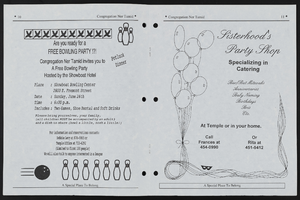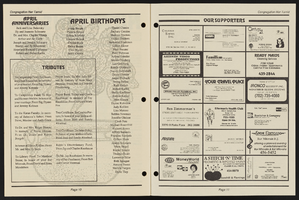Search the Special Collections and Archives Portal
Search Results
Audio clip from interview with David and Iris Torjman, November 12, 2015
Date
Archival Collection
Description
In this audio clip, Iris and David speak about going to shows at the hotels in Las Vegas in the 1960s through the 1990s. David Torjman was the Hebrew School teacher at Temple Beth Sholom and taught the children and grandchildren of many hotel owners and operators. They speak about their wedding reception during which Sasha Semenoff played.
Sound
Maude Woo oral history interviews
Identifier
Abstract
Oral history interviews with Maude Woo conducted by Barbara Tabach on February 11, 2007 and February 25, 2007 for Reflections: the Las Vegas Asian American and Pacific Islander Oral History Project. In these interviews, Woo discusses her early childhood in Korea, taking care of her siblings, and difficult memories of war. Later, she discusses travelling to the United States and having foster parents, and going to college for nursing. She married her first husband and they had two sons, David and John. The family moved to Orange County, California where Maude raised the family and eventually started a private practice. Later, Woo divorced her first husband. She married her current husband, Leland, in 2011. She discusses her family, the importance religion has in her life, and coming to Las Vegas, Nevada to retire. Digital audio and photographs available; digital transcript draft available.
Archival Collection

Transcript of interview with Jane Greenspun Gale by Barbara Tabach January 31 and February 9, 2018
Date
Archival Collection
Description
Jane Greenspun Gale-actor, activist, writer, magazine publisher, philanthropist, and farmer- has filled her life with accomplishments such as the Animal Foundation and Springs Preserve. It has also been a life filled with adventure - from “looking for John Lennon” during her time living and studying acting in London to learning to raise chickens on the acres of the Gilcrease Farm she owns with husband and photographer Jeff Gale. Everyone calls her Janie. Born Jane in 1949, she is the third of four children born to community leaders Barbara and Hank Greenspun. In this oral history, Janie captures the fun of growing up in Las Vegas under the watching eye of Hank. As a teen she and her friends cruised Fremont Street. Several years later she wanted to be arrested protesting the Atomic Test Site, when Hank diverted her into reporting about the event instead. Her Jewish foundation was at Temple Beth Sholom, where her parents were among the founding members. As the Jewish population grew, the tastes in synagogues grew to reflect the change. When Janie’s children preferred the Reform approach at Congregation Ner Tamid, a new family tradition began. She is proud of her background and shares loving stories of time spent with her grandparents as a child and pride in the heroic and dramatic story behind the naming of Hank Greenspun Plaza in Israel. Even her love story with Jeff is a tale made for movies. It unfolds in this engaging oral history interview along with anecdotes that are plucked from her personal history and preserve a reflection of growing up in Las Vegas, one of the Greenspun family of local fame.
Text
Rabbi Felipe Goodman oral history interview
Identifier
Abstract
Oral history interview with Rabbi Felipe Goodman conducted by Barbara Tabach on March 09, 2015 for the Southern Nevada Jewish Heritage Project. Goodman discusses becoming a rabbi of the oldest synagogue in Las Vegas, Nevada, the Rabbi Board, and about Las Vegas’ Jewish community.
Archival Collection

Transcript of interview with Walter Weiss by Claytee White, November 2, 2010
Date
Archival Collection
Description
In this interview, Walter Weiss discusses how Judaism and boxing kept him out of trouble in his youth. Weiss grew up in the Boston area, and started boxing as a teenager. Weiss talks about his boxing training, becoming a runner for a bookmaker, and coming to Las Vegas in the 1950s to be a bookmaker for the Stardust Hotel, and working the slot machine floor. He had several different jobs in various casinos, and discusses different people involved in the gaming industry in Las Vegas.
Walter Weiss life story begins in a Malden, Massachusetts during the Great Depression. His early background was a blend of observant Judaism, secularism, and the effects of the era. He was a troubled youth whose older brother encouraged him to join him in boxing. As Walter explains: I was a wild kid and ... boxing saved my life. His aptitude for boxing led him to be a sparring partner in New York City's famous Spillman Gym. There he met and worked out with some of the greatest fighters of the era, including Rocky Marciano. He recalls how he turned professional while attending the University of Miami and how he first came to Las Vegas in 1958 to escape his personal troubles and find work with a local bookmaker. Thus began his diverse employment history in the casino industry. He details his various positions and the cast of famous and infamous characters of the times. For six years he return to New York and worked as a Wall Street broker before arriving back in Las Vegas in 1973. He talks about his property ownership, lobbying for an amendment to Senate Bill 208, his personal religious changes and a sundry of observations about the changes that occurred as the state took over gaming.
Text





